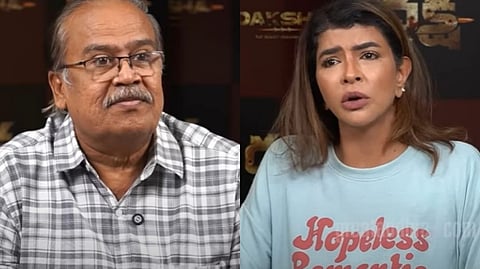

Follow TNM's WhatsApp channel for news updates and story links.
Telugu actor and producer Lakshmi Manchu has filed a formal complaint with the Telangana Film Chamber of Commerce (TFCC) against a senior journalist for allegedly bodyshaming and making ageist remarks about her, during a recent promotional interview for her new film Daksha: A Deadly Conspiracy. The journalist had posed a sexist question to Lakshmi, suggesting that her dressing choices were “inappropriate” for a woman in her 40s who is also a mother.
In her statement to the TFCC, Lakshmi wrote, “India is a country that reveres women as Shakti, yet when we step into professional spaces, we are subjected to casual misogyny, humiliation, and disrespect. This cannot continue. I owe it not only to myself but to the many young women who look up to me to call this out.” While clarifying that she has no objection to tough questions as a public figure, she stressed that “cruelty masked as journalism” cannot be tolerated.
The actor demanded a public apology and urged the TFCC to ensure such incidents are not repeated. “Respect is not optional. Accountability is not negotiable,” she added.
A clip of the interview, showing Lakshmi confronting the journalist, is now doing the rounds on social media. In it, he can be seen asking her about her “dressing sense,” when she snaps and asks: “Would you ask a man the same question? How dare you! How dare you ask me that?” She goes on to point out that nobody tells Mahesh Babu, who is 50, to stop going shirtless, and yet women are questioned for wearing what they want once they cross 40.
For anyone unfamiliar with Telugu cinema, this might look like just another lapse of judgment on the journalist’s part. But for those who have followed the industry more closely, it is hardly surprising. The film press has long maintained a parallel career in policing the appearance of women actors — their weight, their clothes, their supposed ‘expiry date’ once they become mothers — while reserving fawning admiration for male stars who are decades older and just as often shirtless.
Lakshmi’s outburst, then, is less about one offensive remark and more about an entrenched culture. Tollywood, like other Indian film industries, has a long history of casual sexism, whether through directors telling young women they are “too fat” or “too thin” to be heroines, or journalists framing marriage and motherhood as the end of a woman’s on-screen career. Male actors in their fifties and sixties continue to romance women half their age without scrutiny, while women actors crossing 35 are reminded of their “place.”
This scrutiny goes beyond body image or wardrobe choices. Journalists have repeatedly crossed lines with intrusive or vulgar questions. In 2022, Suresh Kondeti, a journalist and producer, faced criticism for asking actor Siddhu Jonnalagadda at a trailer launch whether he had counted the number of moles on his co-star Neha Shetty’s body in real life — mirroring a question in the film. While Siddhu declined to respond, Neha registered her protest, and social media backlash followed. Suresh later defended himself, claiming his intention was “clean” and “without double meaning.”
There was another instance where an interviewer asked actors Nani and 17-year-old Krithi Shetty “who was most comfortable among the two” while filming a kissing scene in Shyam Singha Roy. Sai Pallavi interjected, highlighting the discomfort such questions create. Krithi Shetty later told TNM that reporters need sensitisation and must consider how they would feel if asked the same questions.
Earlier this year, director Trinadha Rao Nakkina apologised after publicly suggesting that he wanted actor Anshu Ambani to “eat more” and “gain weight” because “everything should be in big sizes for Telugu audiences.” Actor Kavya Kalyan Ram has described how she was repeatedly asked to slim down at the start of her career.
It is now common knowledge how Radhika Apte, speaking about her Telugu film work, described the industry as “patriarchal, male-dominant and male chauvinistic,” where women’s roles and treatment often reduce them to objects in service of men.
Women who speak out about objectification or sexist treatment also frequently face backlash from fans. Taapsee Pannu, after criticising veteran director K Raghavendra Rao’s obsession with actresses’ navels, was forced to clarify that her comments were self-directed and not intended to hurt anyone. Similarly, Pooja Hegde spoke about the objectification of women in Ala Vaikunthapurramuloo, highlighting scenes where her character was ogled for comedic effect, but later had to issue a clarification to address misinterpretation and online trolling.
Women’s personal lives are also policed. During the promotions of Daksha, Lakshmi also highlighted how divorced women often face career repercussions. She cited a popular actor, widely understood to be a Telugu actor’s ex-wife, who has allegedly been unofficially blacklisted after her divorce. “If a man gets divorced, his life doesn’t change. But for a woman… no one gives us freedom. We have to take it ourselves,” she said, underscoring the pervasive double standard in Tollywood.
That Lakshmi felt compelled to lodge a formal complaint against the senior journalist is significant. Most such incidents are brushed off as ‘banter’ or ignored entirely. Whether the TFCC will act on her complaint remains to be seen, but her statement has already articulated what women in the industry have long known — that respect is treated as optional, and accountability as negotiable.
In the end, it isn’t Lakshmi Manchu’s dress that is inappropriate. It is the persistent double standard that allows men to age into ‘legends’, while women are interrogated for daring to still exist on their own terms. That, unfortunately, is par for the course in Telugu cinema.
Views expressed are the author’s own.